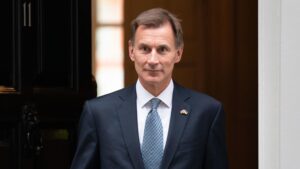Jeremy Hunt has confirmed that he will announce plans to reduce energy support for businesses in the Commons next week, telling industry leaders it was “unsustainably expensive”.
The chancellor has told business groups that a package providing support at a “lower level” than current measures would be available to them beyond March, promising to avoid a “cliff edge” in curtailing the subsidy.
The government introduced support for “non-domestic” energy customers bills in October, alongside financial help for household gas and electricity bills. The scheme, which cuts the bills for organisations including businesses, hospitals, schools and charities, was due to end in March.
Hunt met business groups on Wednesday to hear their concerns about the cost of energy, which remains high owing to an increase in the cost of wholesale gas over the past 18 months. Business groups including the CBI, the Federation of Small Businesses (FSB0, UK Hospitality, the Institute of Directors and the British Chambers of Commerce (BCC) attended the meeting.
The government said that the energy scheme was “one of the most generous in Europe”, but added “no government can permanently shield businesses from this energy price shock”. The cost has been estimated at about £20bn for the six months until the end of March.
In a statement after the meeting, government officials said: “Extending the scheme at current levels could cost tens of billions of pounds, with costs potentially doubling or tripling if international energy prices increase further than expected. It is vital that taxpayer’s exposure to volatile international energy prices is reduced.
“However, the chancellor also heard the concerns of the business community who are facing high energy prices, and explained that any future support, while at a lower level, would be designed to help them transition to the new higher-price environment and avoid a cliff edge in support.”
Under the scheme, the government funds a discount on non-domestic customers’ gas and electricity bills. It covers the cost between a wholesale prices and a “government supported price” of £211 per MW hour for electricity and £75 per MW hour for gas.
Hunt will lay out the detail of the reduction in financial support next week. The BBC reports that the government plans to halve the current level but that the scheme will run for a further year until March 2024.
Shevaun Haviland, the director general of the British Chambers of Commerce, said: “More than a third of firms have told us they are finding it difficult to pay their energy bills even when they are in receipt of government support.
“Any continued help is welcome, but it is now clear the new plan will be at a lower level than the existing one. That’s unsurprising, given the state of public finances, but this will still have a significant impact on many businesses.”
It remains unclear whether the government will follow through on plans to tailor the support by sector or pursue a simpler option to continue to cut all firms’ bills.
Tina McKenzie, policy chair of the FSB, said: “Let’s not forget this energy price crisis affects all small businesses, which typically have lower margins and are least able to deal with cost pressures.
“That’s why we want to see an extension of the energy support scheme which takes into account the size of the business, rather than focused on specific sectors. This will help restore hope and optimism and grow our economy”
The chancellor’s actions mirror his intervention on household energy bills. The former prime minister Liz Truss caused concerns over spending by announcing a two-year plan to cut bills, before Hunt shortened the scheme to 18 months.
The Treasury has been handed a boost in recent days by falling wholesale gas prices, which raised hopes that efforts to cut energy bills may not prove as costly as first feared.
Separately a BCC survey of more than 5,600 firms showed that business confidence and sales have stabilised at low levels, while inflation remains the biggest factor of concern.
The study indicated that, while the change in administrations from Truss to Rishi Sunak stabilised financial markets, measures announced in Hunt’s autumn statement in November appear to have had “no impact” on business confidence.
Read more:
Hunt confirms cut to ‘unsustainably expensive’ business energy support
























